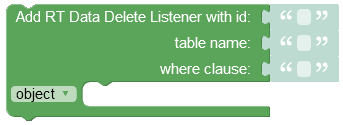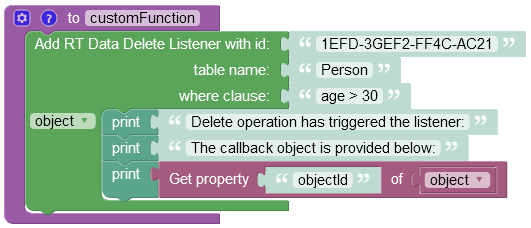Conditional Delivery Of Deleted Objects¶
Consider a data table called Order. The table contains a column named orderAmount. The code below adds a listener for the delete event for the Order table.
const orderEventHandler = Backendless.Data.of( 'Order' ).rt();
const onObjectDelete = object =>
console.log( 'an Order object has been deleted. Object ID - ', object.objectId );
const onError = error =>
console.log( 'Server reported an error ', error );
orderEventHandler.addDeleteListener( 'orderAmount > 1000', onObjectDelete, onError );
function Order() {
this.objectId = undefined;
this.orderAmount = 0;
}
const orderEventHandler = Backendless.Data.of( Order ).rt();
const onObjectDelete = object =>
console.log( 'an Order object has been deleted. Object ID - ', object.objectId );
const onError = error =>
console.log( 'Server reported an error ', error );
orderEventHandler.addDeleteListener( 'orderAmount > 1000', onObjectDelete, onError );
The event listener will receive only the deleted Order objects with the order amount exceeding 1000. This is achieved with the first argument in the addDeleteListener method. The argument is a where clause condition, which references the orderAmount column and requests that the real-time database sends only the matching objects. The second argument is a callback object which will receive any deleted object which matches the where clause condition. Notice the argument of the response callback method is the actual object deleted from the database.
For more information about the whereClause syntax, see the Condition Syntax section of the guide.
Codeless Reference¶

where:
| Argument | Description |
|---|---|
id |
Unique identifier of the new event listener. |
table name |
The name of the data table where a conditional event listener must be registered. |
where clause |
Optional parameter. Sets the condition for an event listener which gets triggered every time the condition is met when the delete operation is invoked for a specific data table. For more information about the where clause syntax, see the Condition Syntax section of the guide. |
object |
When a listener gets triggered, the Backendless delivers a callback object containing the updated object to the listener. |
The example below registers a new event listener for the "Person" data table with the id``"1EFD-3GEF2-FF4C-AC21". The listener is triggered when the where clause condition is met, specifically when an existing object is deleted from the data table and the value in the "age" property is greater than 30.
Assume the where clause condition is met, and the Codeless logic below executes a custom block of code; First the following sentence is printed: "Delete operation has triggered the listener.", then the value of the property objectId is retrieved from the object variable and also gets printed.
